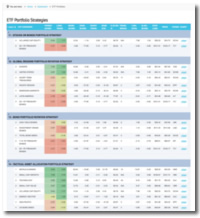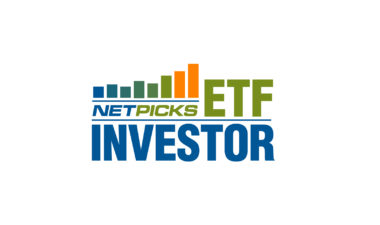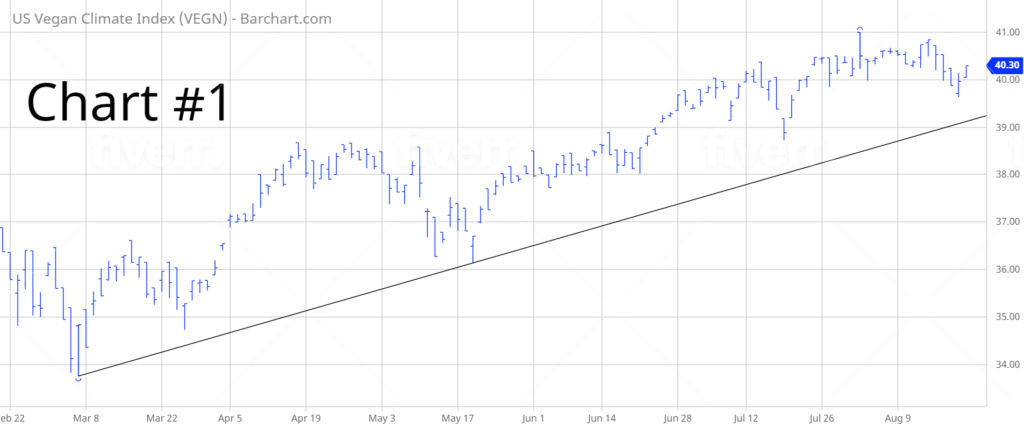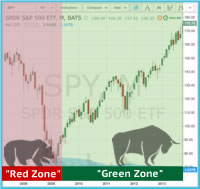
US Vegan Climate ETF (VEGN)
Key Statistics
Thank you for reading this post, don't forget to subscribe!
Minor Support Level 36.13 Minor Resistance Level 41.00
Major Support Level N/A Major Resistance Level N/A
Minor Buy Signal 42.41 Minor Sell Signal 34.73
Major Buy Signal N/A Major Sell Signal N/A
BRIEF OVERVIEW
On 1 July 2019, a monumental shift occurred in our nation’s population. For the first time since 1999, the Baby Boomer generation lost the title as the largest demographic group in the United States. They were surpassed by the Millennial generation, with a population of 72.12 million in July 2019. Baby Boomers peaked in 1999, with a population of 78.8 million. Based on data provided by Pew Research Center, Millennials will peak in 2033, with a population of 74.9 million. Unlike previous demographic groups, the death rate of Millennials during the next two decades will have very little impact on the overall population. For example, the projected Millennial population in 2050 will be 72.2 million.
Over the course of the next 20 years, the population will decline by only 2.7 million. How is it possible for the Millennial demographic group to remain so strong? The answer can be found in our nation’s immigration policy. According to Pew Research, immigration will add more numbers to Millennials during the next two decades than any other demographic group. Therefore, Millennials will play a major role in shaping the US economic environment for the next several years.
In addition to the Millennial population, Generation Z will also lay the groundwork in determining the economic trends of the United States well into the future. As you can see from the table, the Gen Z population in 2019 was 67.17 million. This particular cohort is growing incredibly fast, recently surpassing Generation X as the third largest demographic group in the United States. Today, Millennials and Generation Z comprise over 50% of the US population. Going forward, these two demographic groups will carry an enormous amount of influence on the spending patterns of the US population for the next few decades.
United States Population
Demographic Groups
Year Demographic Birth Range Population
2019 Millennials 1981 – 1996 72.12
2019 Baby Boomers 1946 – 1964 69.56
2019 Generation Z 1997 – 2012 67.17
2019 Generation X 1965 – 1980 65.17
2019 Silent Generation 1928 – 1945 20.87
2019 Greatest Generation Prior to 1928 1.7
Source Statista | Population in millions
During the past few years, young investors have become actively involved in sustainable investing, more commonly known as ESG investing. This new investment philosophy is exploding in popularity among Millennials and Generation Z. Please review the following table.
ESG Investing
2018 $5.4 billion
2019 $21.4 billion
2020 $51.0 billion
According to data provided by BlackRock, ETF inflows specializing in ESG investments have increased 844% within the past three years. Inflows for 2021 are projected to be $84 billion. By 2030, BlackRock is forecasting a market capitalization of $1 trillion for ESG exchange-traded funds registered in the United States. What is ESG investing and why are young investors pouring money into this space? Let’s examine the details.
ESG is an acronym for environmental, social and governance. Essentially, ESG is utilized by socially conscious investors as a measuring device for screening publicly traded companies as possible investment opportunities. Specifically, investors are searching for companies that are focused on providing an ESG-friendly workplace. ESG includes the following characteristics:
Environmental – Investors’ core environmental concerns encompass such things as energy use, waste disposal, pollution, natural resource conservation and treatment of animals. Investors are particularly interested in how a company manages environmental risks such as contaminated land, disposal of hazardous waste, management of toxic emissions and compliance with government environmental regulations. Is the company making a sincere effort to reduce its environmental footprint?
Social – Investors shine the spotlight on a company’s business relationships. For example, what type of relationship does the company have with its suppliers? Does the company work with suppliers who are socially responsible? Are suppliers providing an ESG-friendly workplace? Investors are searching for companies that are committed to working exclusively with socially responsible suppliers. In addition to suppliers, investors examine the role companies play within the community. Does the company donate a percentage of its profits for the betterment of the community? Are employees encouraged to perform volunteer work? Is the company concerned about the health and safety of its employees?
Governance – How well does the company treat its shareholders? Investors are particularly concerned with corporate transparency. For example, does the company use transparent accounting methods? Are shareholders given the opportunity to vote on important issues? Can the company provide assurances to investors that there exists no conflicts of interest in selecting its board of directors? Does the company abstain from using political contributions to obtain favorable treatment from local politicians?
In an effort to provide investors with exposure to ESG investments, Beyond Investing LLC created the US Vegan Climate ETF on 10 September 2019. The ticker symbol is VEGN. The ETF is a perfect vehicle for socially conscious consumers who wish to invest in ESG-friendly companies. VEGN will only invest in companies who play an active role in preventing the exploitation of animals, reducing the use of fossil fuels, protecting the environment and avoiding business relationships with any countries who are guilty of human rights violations. The top five holdings include Nvidia, Microsoft, Tesla, PayPal and Visa.
SHORT-TERM VIEW
VEGN has enjoyed a steady advance over the course of the past nine months. The bulls are in complete control of the short-term momentum. The next level of resistance is 41.00. In order to reverse the momentum, the bears need a weekly close below 36.13. The most likely scenario is a continuation of higher prices.
LONG-TERM VIEW
As little as ten years ago, professional money managers, mutual fund companies and investment bankers scoffed at the idea of launching a thematic investment approach designed exclusively for socially conscious investors. At first glance, this new concept was considered to be too narrowly focused and unable to garner enough support from the professional investment community. However, the financial services industry underestimated the commitment from the younger generation concerning ESG investments.
As we previously mentioned, the total value of domestic ETFs specializing in ESG investments is projected to be $84 billion by the end of 2021. This number is projected to increase to $1 trillion by 2030. Although the ETF growth rate is quite impressive, it pales in comparison to global value of ESG assets. According to data provided by Bloomberg Intelligence, the total amount of assets under management specializing in ESG is a staggering $37.8 trillion as of year-end 2020. Please review the following table.
Global AUM Specializing In ESG
2016 $22.8 trillion
2018 $30.6 trillion
2020 $37.8 trillion
2025 $53.0 trillion
The total value of all assets under management on a global basis is projected to reach $140.5 trillion by 2025. As you can see from the table, $53.0 trillion will be derived from ESG. On a percentage basis, 38% of all assets under management will focus on ESG. These numbers are absolutely incredible based on the fact that ESG was practically non-existent ten years ago.
It is a true testament to young people’s ability to band together, primarily through social media, in an effort to increase consumers’ awareness of societal issues such as climate change, overpopulation, civil rights, health care availability, childhood obesity and other important matters.
In regard to VEGN, it’s difficult to provide a long-term view based on the fact that the ETF has been in existence for less than two years. However, according to the limited amount of available data, VEGN has performed exceptionally well since its inception.
SHORT-TERM TREND – VEGN
Please review the 6-month chart of VEGN (Chart #1). The ETF remains in bullish territory on a short-term basis. VEGN has carved out an impressive trendline dating back to 5 March. As long as VEGN stays above 39.25, the trendline will remain fully intact.
LONG-TERM TREND
It’s difficult to provide a long-term analysis based on the fact that VEGN has only been in existence since 10 September 2019. However, the limited amount of available data confirms that VEGN has performed exceptionally well since its inception.


